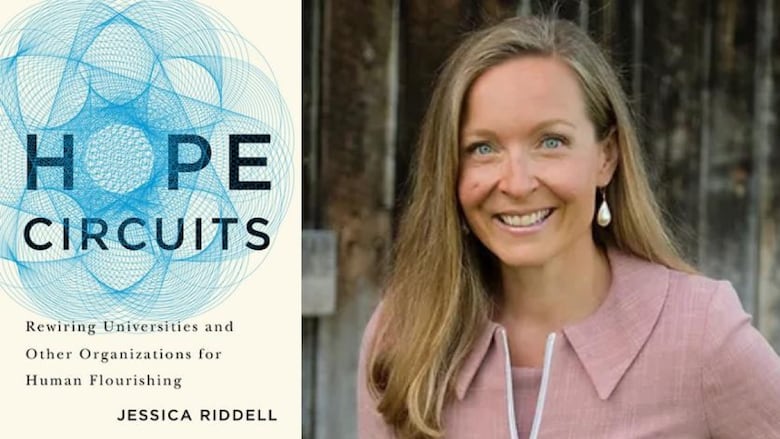In a time of 'permacrisis' the need for hope is critical, says academic
Scholar Jessica Riddell argues fostering hope is imperative for universities

In 2022, Collins Dictionary announced a new word for the year: permacrisis.
A noun to describe "an extended period of instability and insecurity, especially one resulting from a series of catastrophic events."
"And then 2024 looked at 2022 and said, 'Hold my beer,'" Jessica Riddell told an audience at the University of Prince Edward Island's 2024 Shannon K. Murray Lecture on Hope and the Academy earlier this month.
She argues educators are wired for hope and encourages them to teach hope, share it, and imagine a better future.
Riddell is an author and award-winning English professor who teaches early modern literature at Bishop's University. Her lecture title is inspired by a quote from Nigerian poet and scholar Bayo Akomolofe, The Times are Urgent: We must Slow Down.
"My default response when 'times are urgent' is to speed up, so the second part of that sentence — we must slow down — knocks me sideways," Riddell said.
"Thanks to late-stage capitalism, when things get hard, I have learned to hustle harder. I work more, teach more, write more, meet more."
But there's something we need to acknowledge when we are in this state of urgency, Riddell says: we feel relevant.
"We get something out of this rush: we feel essential, irreplaceable, and needed." So the challenge becomes how do we condition ourselves to find purpose when we are overwhelmed?
"We must slow down."
A love letter to universities
In the early days of COVID, Riddell juggled children while working from home, enjoyed kitchen dance parties and finished the first draft of a book called Shakespeare's Guide to Hope, Life, and Learning, written with co-authors Lisa Dickson and Shannon Murray.
"I clung to our book like a life preserver, reading and re-reading the lessons on hope and empathy and love we had written before the global pandemic, not knowing at the time how much our future selves would rely on these hope muscles," Riddell said.
But it was when Riddell's husband was diagnosed with lung cancer that her reliance on hope was tested.
"I needed hope to get me out of bed when the world felt urgent and immense," Riddell said. "I started to write my way into hope in the context I knew best — higher education — and began to write a love letter to universities as the anchors of hope in our communities."
Writing became a coping mechanism, a way out of despair for Riddell.
"As it turns out, I was writing the book I needed to read."
Hundreds of books that Riddell has read point to a broken and irreparable view of higher education. "But the thing is: we are building our future right now, in real time. Nothing is inevitable."

Universities are in the business of hope, Riddell points out, and learning is the most hopeful of pursuits.
"Let us not forget that hope is badass, dynamic, unruly, audacious, and fierce. One of my favourite means that circulates on social media is Matthew Crowe's fault. And he says, 'People speak of hope as if it is this delicate, ephemeral thing made of whispers and spider's webs. It's not. Hope has dirt on her face. Blood on her knuckles, the grit of the cobblestones in her hair and just spat out a tooth as she rises for another go.'"
Riddell argues the ultimate aim of education is to tap students into their full potential and purpose, not just for individual success, but for the collective flourishing and relational well-being of society.
She says this can only be achieved with hope as its core mission.
Listen to the full lecture where Jessica Riddell lays out her methods for fostering hope. Subscribe and download the IDEAS podcast from your favourite app.
*This episode was produced by Mary Lynk.